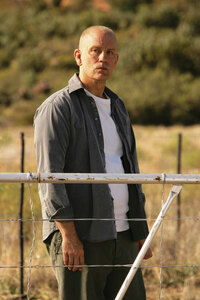Novel’s brutal themes lost in film’s translation
There exists an ongoing and seemingly endless verbal war between bookworms and film geeks since the first instance that The Dreaded Question was uttered. Historians remain unsure as to whether the question spilt first from the lips of a literature aficionado or a cinematic connoisseur; however, they agree that an unknown individual turned to his movie-going partner as the credits rolled across the screen and inquired, “Do you think the movie was better than the book?”
Now, decades after this monumental event occurred, lit lovers and movie nerds can once again suit up in their armor of argument as yet another adaptation of a novel hits the silver screen.

Anti-hero · Based on a novel of the same name, Disgrace follows the plight of morally conflicted professor David Lurie (John Malkovich). - Photo courtesy of Fiona Press
Based on Nobel Laureate J.M. Coetzee’s award-winning book of the same name, Disgrace stars seasoned film and theater actor John Malkovich as David Lurie, a divorced husband, father and professor of romantic literature at a university in post-apartheid South Africa.
A self-proclaimed ladies man, Lurie engages in numerous affairs with women to satisfy his unbridled sexual cravings. “‘Sooner murder an infant in its cradle then nurse unacted desires,’” Lurie quotes midway through the film.
However, when he is accused of raping one of his students — who is of mixed race — Lurie abandons his position at the university and lives in exile with his daughter, Lucy (newcomer Jessica Haines, in a promising debut) at her farm in the countryside. Their somewhat peaceful existence is brutally interrupted by a vicious attack on their farm by three young black men.
After discovering that his daughter was raped during the attack, Lurie is forced to reconsider his responsibilities as a father and as a citizen in a multiracial community.
The South African-born Coetzee tackled the ambitious subject material of sexual desire and interracial relations in a hefty 224 pages, prompting it to be ranked No. 1 in “The greatest novel of the last 25 years” list by The Observer in 2006. On the other hand, director Steve Jacobs and his wife, screenwriter Anna-Maria Monticelli, have only 120 minutes to cut the meaty novel into a similarly powerful and effective movie. What they have produced is a film ripe with equal amounts of dialogue and brooding silence, but sorely lacking in any type of cinematic or visual identity.
It is undeniable that Jacobs, a former AFI Best Actor award winner, knows how to direct a scene of dialogue. One particular scene involving Lurie’s repentance to the father of the devastated student stands as one of the most powerful and poignant moments in the film. However, it appears that the director has sacrificed the use of cinematography to heighten the drama by placing his camera in the least obtrusive position from his actors.
Ultimately, it is left to Malkovich and his impressive acting chops to rescue the film. The beloved actor, famous for his instantly recognizable and strangely entrancing monotonous voice, certainly gives a compelling performance. He bravely undertakes the difficult task of establishing the viewer’s sympathy for Lurie, a dynamic character with a “mad heart” whose vile actions should be condemned. Yet Malkovich’s best work has come, arguably, under the direction of visionary filmmakers with distinct styles, such as Spike Jonze’s Being John Malkovich, Steven Spielberg’s Empire of the Sun and Wolfgang Petersen’s In the Line of Fire. The audience is left wondering whether the stage and its heavily performance-based attributes would have been a far more effective medium for the adaptation of the novel.
Above all of the film’s faults, it is the impossibly daunting subject matter that inevitably dooms Disgrace. Just as the audience becomes invested in Lurie’s plight and expects the film to deconstruct the idea of man as a sexual being, the film promptly switches to Lucy’s farm and the weighty topic of interracial relations.
Jacobs and Monticelli simply have brought too much to the table for the audience to digest. What is most unfortunate is that the viewer is forced to return to the original work after watching Disgrace, not out of a peaked interest but out of the necessity to get the experience that Coetzee intended for his novel.
Perhaps, the argument between book lovers and movie fanatics is founded on the wrong question. Whether the movie manages to stand alone from its original material provides much more intriguing fodder for debate.

Excellent article. And, well written. Thank you AJ. I look forward to reading more of your film reviews.